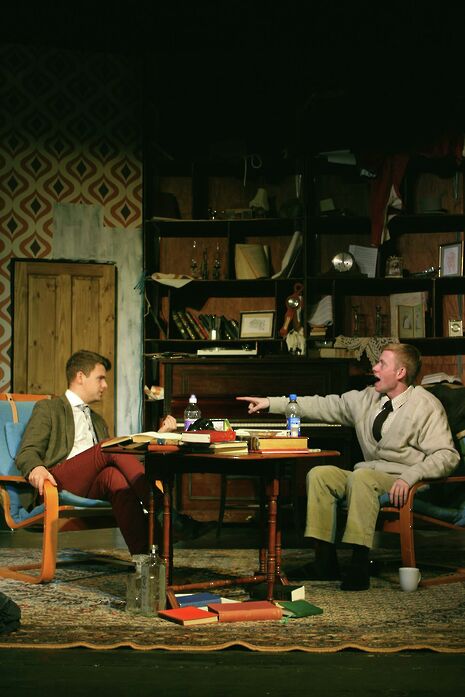Review: The Habit of Art
Thomas O’Connor greatly enjoyed the ADC’s witty performance of Alan Bennett’s play-within-a-play

Nothing should get in the way of the creative mind, according to The Habit of Art at the ADC. The artist is nobody when not active, and Fletcher Players’ production of this multi-layered piece by Alan Bennett is both active and creative right the way through. The set-up is complex: the action takes place in a rehearsal room at the National Theatre, during the development of a new play on W.H. Auden and Benjamin Britten. The actors, stage manager and writer have assembled, and attempt to get through an early rehearsal. The actors jump in and out of their play-within-a-play characters. The stage manager attempts to maintain order: the writer despairs at what is happening to her script. It could have been a farce, but Bennett gives us something much darker. The bawdiness of the first act is smashed into context by the exploration of Britten’s sexuality in Act Two. The boundaries between innocence and temptation are blurred beyond recognition.
The strong and witty cast are directed by Isaac Jordan, who shows a true understanding for the script. The pacing is generally spot-on, with the timing producing the laughter that Bennett’s script deserves. At the heart of the piece are the ageing actors Jon Tothill and Tim Vaughan, who take on the roles of Auden and Britten respectively. Vaughan is astonishing in his ability to capture the thespian lightness of Henry, and the introverted grandeur of Britten. His physicality, his manner, and indeed his very voice transform between the two personas. While his delivery of Britten is mature and measured, he manages to achieve some great comic pay-offs by sending this up as Henry. Tothill comes into his own during Act Two, when, unburdened by Fitz’s annoying habits of interruption, he is free to fully become Auden. The two men engage in serious discussion about companionship and desire: the smut of the first act falls into perspective. By this point we are drawn into the world of Auden and Britten’s deliberations on Death in Venice, and have almost forgotten that we are sharing a rehearsal room. The other actors, the prompts, and pauses for additional props become irrelevant due to the strength of the delivery: huge credit is due to the cast and director for achieving and maintaining this balance.
The two-part set (designed by Georgemma Hunt) has Auden’s gloriously cluttered college room sitting within the emptiness of a rehearsal space; with lighting by Karolina Hes, the focus is firmly drawn into the central dramatic conversation, then snapped back out in the reality of the surroundings as needed. Eliza Spindel provides a humorous mix of contemporary dress and vintage costumes, and the changes in the closing scene highlight the reality of life as an actor.
Ben Martineau displays genuine frustration as actor Donald trying to find his motivation to play the interviewer Carpenter: his handling of the dual role is remarkably solid. Equally compelling is Jamie P. Robson as Tim the actor, who plays the naïve rent boy. Behind his relaxed conversational style and smiley charisma is the unease of being surrounded by people whose talents he does not understand, but whose desires he is rather jaded with. As an audience, we share this unease at the topics discussed by Britten and Auden. But we also share his fascination at what he witnesses.
The writing of The Habit of Art is perhaps overly complex. Occasionally the peculiarity of the script proves too much for the director and cast to handle convincingly. The inevitable first night hiccoughs were professionally masked, and even the unplanned intrusion of the houselights could be explained away within the context of the setting. This production aims high, and delivers both the humour and the darkness needed to achieve the ambitions of its complexity. In Auden’s words, it gets on with what it is good at.
 News / SU reluctantly registers controversial women’s soc18 December 2025
News / SU reluctantly registers controversial women’s soc18 December 2025 News / CUP announces funding scheme for under-represented academics19 December 2025
News / CUP announces funding scheme for under-represented academics19 December 2025 Features / Should I stay or should I go? Cambridge students and alumni reflect on how their memories stay with them15 December 2025
Features / Should I stay or should I go? Cambridge students and alumni reflect on how their memories stay with them15 December 2025 Fashion / The art of the formal outfit 18 December 2025
Fashion / The art of the formal outfit 18 December 2025 News / Dons warn PM about Vet School closure16 December 2025
News / Dons warn PM about Vet School closure16 December 2025









